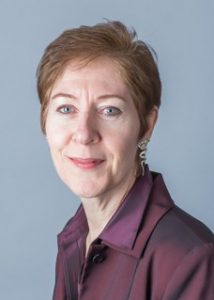A Message from Dean Barrett
A few weeks ago, we kicked off our annual lecture series, Without Limits: Interdisciplinary Conversations in the Liberal Arts. If the size and rapt attention of the audience is any indication, this year’s theme, Citizenship, clearly resonated with the campus, and why wouldn’t it? Each week it seems a new debate about our national identity and character emerges, prompted by marches of white nationalists, expressions of freedom of speech, the treatment of people of color and women across the country.

The title of the faculty panel, “The Politics of Belonging,” strikes at the heart of the issue, and Drs. Cesar Barros, Nicole Carr, and Sharina Maillo-Pozo grappled with a panoply of kinds of belonging – as an undocumented immigrant, an African American, and a woman of color in the academy. One common thread among the talks made clear that belonging is often (perhaps always) defined by its inverse, alienation. Whether we intend to or not, we create community through exclusion, and the very definition of our groups relies on binaries, the most fundamental of which is inside/outside.
In this regard, stasis is the enemy. Dr. Barros argued that citizenship “cannot have the structure of a club.” It is, instead, something that we must continue to create with unflagging vigilance, through uncomfortable dialogue and by interrogating language. While the solutions are evasive and ambiguous, panelists recommended increasing diversity, not just in numbers but in voices, within a community, engaging in hard conversations, and confronting the implicit (and explicit) biases that many of us don’t even notice because they are so much a part of the fabric of society in which we live, as Dr. Carr noted.
The goal of Without Limits is to highlight the often invisible work of the humanities and social sciences, and, here, we might stop to consider what it means to be a full-fledged citizen of the academy, as Dr. Maillo-Pozo did in her talk. In a time when so much effort is placed on assessing higher education through employment statistics of graduates and longer-term success of alumni, it’s worth observing that higher education must do more than prepare students for jobs. It needs to prepare students for productive and fulfilled lives as children, parents, siblings, partners, employees, neighbors, and, yes, citizens, a role that demands a diligent awareness about issues of inclusion, equality, diversity, resource distribution, and environmental management and a constant investigation of the policies that reinforce exclusion.
The liberal arts provide the foundation for that investigation. The humanities and social sciences explore what it means to be human and live within social institutions; our faculty encourage students to challenge the status quo, interpret historical, literary, cinematic representations of the past and present, analyze the motives that may lie behind policies and laws, and marshal evidence and arguments to make the world – and the country – a better place. Our attention to the enduring questions of identity, communication, and community is what makes these disciplines essential to higher education, to an informed and responsible citizenry, and finally to the success of individuals and the whole.
At the end of the panel, a faculty member from another institution observed that these kinds of conversations don’t happen in his institution, which made me realize how many opportunities our campus offers, like Conversation One, led by Dr. Mark Colvson, Dean of the Sojourner Truth Library. A few weeks ago I had the pleasure of participating in one of those conversations with students, faculty, administrators, staff, and our most recent Distinguished Speaker, Janus Adams, to discuss race and diversity. We grappled with how cultural sea changes occur – from the top down through policy and law or from the bottom up, by changing hearts and minds one neighbor at a time. There were no wrong answers, but one inspiring one noted the importance of art, particularly literature, in helping to open people’s eyes and make them question assumptions they had lived with for decades. It was heartening for me to hear a student express the importance of art not only as an aesthetic expression of cultural values but as a dialogue with readers about those values, a challenge to the way we perceive the world, an education about the past that may have been excised from history books and a present that is invisible to the privileged, and finally as a warning about the future. (Apparently, artificial intelligence exhibits racism and sexism, lending new meaning to the adage “garbage in, garbage out.”)
While it’s a stressful time for the world, it’s an important time for the liberal arts. The work we do is more important than ever; the future literally depends on it. As President Obama stated when he exited the White House, “So, just as we, as citizens, must remain vigilant against external aggression, we must guard against a weakening of the values that make us who we are…[R]emember, none of this happens on its own. All of this depends on our participation.”
